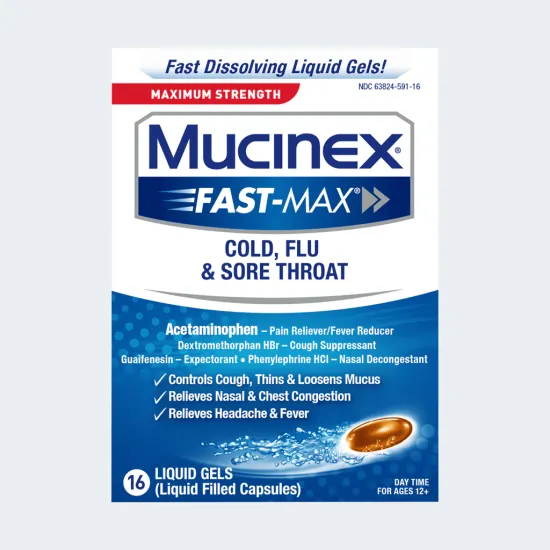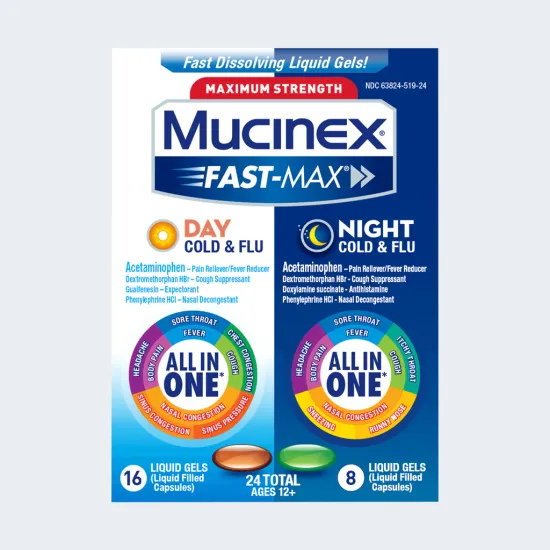
Uncommon and Common Flu Symptoms
Shop the article



21 AUG 2024
No one likes to get sick, but the flu can hit especially hard. Flu symptoms typically develop quickly and, in some cases, can become serious. Here are some common symptoms of the flu to look out for.
Common Flu Symptoms
Tiredness and Fatigue
The flu virus changes quickly, so each flu has the potential to be different than the last. But you can count on feeling pretty wiped out from any flu. Your body has to work hard to fight off the offending virus, so you'll feel exhausted for up to two to three weeks.
Achiness
You might develop aches and pains as your flu hits. As the flu virus takes hold of your body, you may experience varying degrees of discomfort in your muscles and joints. These aches and pains can make the simplest movements difficult and significantly impact your overall well-being.
The intensity of the aches and pains can vary from person to person. It may range from mild discomfort to more severe sensations. It's not uncommon to feel a deep, lingering ache in your muscles, making it challenging to find relief or achieve a comfortable resting position.
Combat aches and pains by choosing a flu medication that contains acetaminophen, a pain reliever. Maximum Strength Mucinex® Fast-Max® Cold, Flu & Sore Throat caplets can help.
Coughing
Another common symptom of the flu is coughing. When the flu virus invades your respiratory system, it can irritate the lining of your throat and airways, triggering a persistent and sometimes severe cough. This cough is typically dry and hacking (nonproductive), causing discomfort and a raspy sensation. It may worsen during the early stages of the illness and gradually subside as your body fights off the infection. However, it's important to note that in some cases, the flu can also lead to a productive cough with mucus.
Headache
A headache is a common and often unwelcome companion of the flu. As the flu virus infiltrates your body, it can cause inflammation and irritation in your sinuses, nasal passages, and even the blood vessels in your brain. This inflammatory response can lead to the throbbing, persistent pain characteristic of a flu-related headache.
Fever
While uncomfortable, a fever is your body's way of fighting the offending virus. The increase in internal temperature accelerates the chemical reactions of your immune system, helping to combat the virus more effectively. However, it does not prevent the virus from infecting cells. Fevers commonly range from 100 to 102 degrees Fahrenheit.
Some cases of flu can trigger a higher-than-usual fever, reaching up to 104 degrees Fahrenheit. This high fever may last for three to four days before subsiding. It's important to note that many people with the flu don't develop a fever. This is particularly common in older individuals or those with compromised immune systems.
Less Common Flu Symptoms
You might also feel sick to your stomach and vomit (a symptom common in kids but less so in adults). You might also develop some allergy-like symptoms (like a runny nose, sneezing, and sore throat) with your flu.
In this case, you'll want a medication to help clear nasal congestion and stifle sneezing, like Maximum Strength Mucinex�® Fast-Max & Day Cold and Night Cold & Flu.. The liquid gels contain a nasal decongestant to help you breathe more easily. Additionally, the Night Cold & Flu product contains doxylamine succinate to relieve sneezing and runny nose, helping you get to sleep.
More Than Just the Flu
Sometimes, what starts as a flu can morph into something more serious. Fighting off the flu might make you more vulnerable to other infections and temporarily increase your risk of pneumonia.
Talk to your doctor if your symptoms start to improve, then suddenly return with a vengeance since that might signal that you've picked up another infection. And seek immediate medical attention if you're having trouble breathing, feel dizzy or confused, develop a fever with a rash, or experience chest or abdominal pain.
Finding Relief for Common Symptoms of the Flu
We know you don't feel like doing much when you've got the flu, but taking these simple steps may help:
- Use Over-the-Counter Medication: To help relieve your symptoms, pick up flu medication, like Maximum Strength Mucinex® Fast-Max® Cold & Flu (All-in-One) Liquid. Read the label carefully, and don't exceed the dosage recommendation.
- Rest Up and Hydrate: Give your body a chance to fight off and recover from your flu, and stay hydrated with plenty of fluids.
- See a Doctor: Call your doctor if you have the symptoms of concern listed above, you're not getting better after two weeks, or over-the-counter medication isn't controlling your symptoms.
Summarizing Common Flu Symptoms
In summary, the flu is an illness that can hit hard, causing a range of symptoms that can disrupt your daily life. Common flu symptoms include tiredness and fatigue, achiness in the muscles and joints, coughing (both dry and sometimes with mucus), headaches, and fever. Less common symptoms may include nausea, vomiting, runny nose, sneezing, and a sore throat.
It's important to recognize that the flu can sometimes lead to complications, such as increased vulnerability to other infections or the temporary risk of pneumonia. Medical attention is crucial if symptoms worsen or certain warning signs arise. While dealing with the flu, rest, hydration, and over-the-counter medications can provide relief. Remember to consult a doctor if symptoms persist or worsen after two weeks or if over-the-counter medication is not effectively managing your symptoms.
Resources
- The University of Missouri Medical Center: Recovering from Flu (2014), Slow Down, Watch for Danger Signs
- Centers for Disease Control and Prevention (2022), Clinical Signs and Symptoms of Influenza
- Centers for Disease Control and Prevention: Similarities and Differences between Flu and COVID-19
- Centers for Disease Control and Prevention: Cold Versus Flu
- Centers for Disease Control and Prevention: Flu Symptoms & Complications
